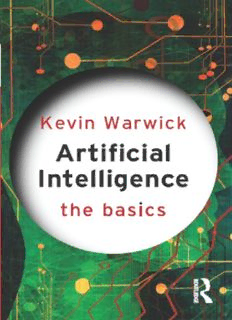
Artificial intelligence: the basics PDF
Preview Artificial intelligence: the basics
ARTIFICIAL INTELLIGENCE THE BASICS Artificial Intelligence: The Basics is a concise and cutting-edge introduction to the fast-moving world of AI. The author Kevin Warwick, a pioneer in the field, examines issues of what it means to be man or machine and looks at advances in robotics that have blurred the boundaries. Topics covered include: how intelligence can be defined whether machines can ‘think’ sensory input in machine systems the nature of consciousness the controversial culturing of human neurons. Exploring issues at the heart of the subject, this book is suitable for anyone interested in AI, and provides an illuminating and accessible introduction to this fascinating subject. Kevin Warwick is Professor of Cybernetics at the University of Reading, UK, where he carries out research in artificial intelligence, control, robotics and biomedical engineering. The Basics ACTING BELLA MERLIN ANTHROPOLOGY PETER METCALF ARCHAEOLOGY (SECOND EDITION) CLIVE GAMBLE ART HISTORY GRANT POOKE AND DIANA NEWALL THE BIBLE JOHN BARTON BUDDHISM CATHY CANTWELL CRIMINAL LAW JONATHAN HERRING CRIMINOLOGY (SECOND EDITION) SANDRA WALKLATE ECONOMICS (SECOND EDITION) TONY CLEAVER EDUCATION KAY WOOD EVOLUTION SHERRIE LYONS EUROPEAN UNION (SECOND EDITION) ALEX WARLEIGH-LACK FILM STUDIES AMY VILLAREJO FINANCE (SECOND EDITION) ERIK BANKS HUMAN GENETICS RICKI LEWIS INTERNATIONAL RELATIONS PETER SUTCH AND JUANITA ELIAS ISLAM (SECOND EDITION) COLIN TURNER JUDAISM JACOB NEUSNER LANGUAGE (SECOND EDITION) R.L. TRASK LITERARY THEORY (SECOND EDITION) HANS BERTENS LOGIC J.C. BEALL MANAGEMENT MORGEN WITZEL MARKETING (SECOND EDITION) KARL MOORE AND NIKETH PAREEK PHILOSOPHY (FOURTH EDITION) NIGEL WARBURTON PHYSICAL GEOGRAPHY JOSEPH HOLDEN POETRY (SECOND EDITION) JEFFREY WAINWRIGHT POLITICS (FOURTH EDITION) STEPHEN TANSEY AND NIGEL JACKSON THE QUR'AN MASSIMO CAMPANINI RELIGION (SECOND EDITION) MALORY NYE RELIGION AND SCIENCE PHILIP CLAYTON RESEARCH METHODS NICHOLAS WALLIMAN ROMAN CATHOLICISM MICHAEL WALSH SEMIOTICS (SECOND EDITION) DANIEL CHANDLER SHAKESPEARE (SECOND EDITION) SEAN MCEVOY SOCIOLOGY KEN PLUMMER TELEVISION STUDIES TOBY MILLER TERRORISM JAMES LUTZ AND BRENDA LUTZ THEATRE STUDIES ROBERT LEACH WORLD HISTORY PETER N. STEARNS WORLD MUSIC RICHARD NIDEL ARTIFICIAL INTELLIGENCE THE BASICS Kevin Warwick First published 2012 by Routledge 2 Park Square, Milton Park, Abingdon, Oxon OX14 4RN Simultaneously published in the USA and Canada by Routledge 711 Third Avenue, New York, NY 10017 Routledge is an imprint of the Taylor & Francis Group, an informa business © 2012 Kevin Warwick The right of Kevin Warwick to be identified as author of this work has been asserted by him in accordance with sections 77 and 78 of the Copyright, Designs and Patents Act 1988. All rights reserved. No part of this book may be reprinted or reproduced or utilised in any form or by any electronic, mechanical, or other means, now known or hereafter invented, including photocopying and recording, or in any information storage or retrieval system, without permission in writing from the publishers. Trademark notice: Product or corporate names may be trademarks or registered trademarks, and are used only for identification and explanation without intent to infringe. British Library Cataloguing in Publication Data A catalogue record for this book is available from the British Library Library of Congress Cataloging in Publication Data Warwick, K. Artificial intelligence: the basics/Kevin Warwick. p. cm. – (The basics) 1. Artificial intelligence. 2. Intellect. I. Title. Q335.W365 2012 006.3–dc22 2011013423 ISBN: 978-0-415-56482-3 (hbk) ISBN: 978-0-415-56483-0 (pbk) ISBN: 978-0-203-80287-8 (ebk) Typeset in Bembo by Wearset Ltd, Boldon, Tyne and Wear CONTENTS List of figures Preface Introduction 1 What is intelligence? 2 Classical AI 3 The philosophy of AI 4 Modern AI 5 Robots 6 Sensing the world Glossary Index FIGURES 4.1 Basic schematic of a neuron 4.2 Basic model of a neuron 4.3 RAM neuron 5.1 Cyclops fish simulation 5.2 Cyclops fish evolved neural network 5.3 Seven dwarf robot 5.4 Simple robot maze PREFACE The field of Artificial Intelligence (AI) really came into existence with the birth of computers in and around the 1940s and 1950s. For the earlier period of its development, attention was clearly focused on getting computers to do things that, if a human did them, would be regarded as intelligent. Essentially, this involved trying to get computers to copy humans in some or all aspects of their behaviour. In the 1960s and 1970s this opened up a philosophical discussion as to just how close to a human brain a computer could be, and whether any differences that arose were really important. This period – referred to as ‘classical AI’ in this book – was, however, rather limited in its potential. In the 1980s and 1990s we saw a whole new approach, a sort of bottom-up attack on the problem, effectively building artificial brains to bring about AI. This completely opened up the possibilities and created a whole new set of questions. No longer was AI restricted to merely copying human intelligence – now it could be intelligent in its own way. In some cases it could still be brought about by mimicking the way a human brain performed, but now it had the potential to be bigger, faster and better. The philosophical consequence of this was that now an artificial brain could potentially outperform a human brain. In more recent years the field has really taken off. Real-world applications of AI, particularly in the finance, manufacturing and military sectors, are performing in ways with which the human brain simply cannot compete. Artificial brains are now being given their own body, with which to perceive the world in their own way and to move around in it and modify it as they see fit. They are being given the ability to learn, adapt and carry out their wishes with regard to humans. This raises all sorts of issues for the future.
Description: